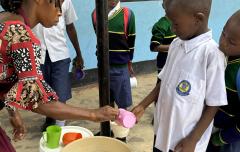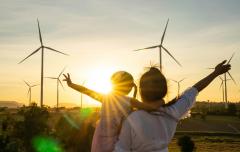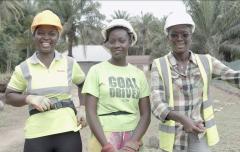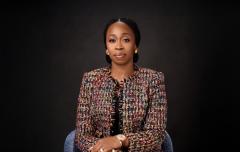Arab region launches Decade of Sustainable Energy for All
Regional, national and local leadership the keys to realisation of Sustainable Energy for All, says SEforALL's Minoru Takada.
On Monday this week, the Jordanian capital, Amman, hosted the Arab launch of the United Nations Decade of Sustainable Energy for All (2014-2024), as declared by the United Nations General Assembly in 2012.
The launch took place under the auspices of the Jordanian Minister of Energy and Mines Resources, Ibrahim Seif, who delivered the opening statement at the event. Also speaking at the opening were Abdalla Al-Dardari, Deputy Executive Secretary of the UN Economic and Social Commission for Western Asia (ESCWA), and Minoru Takada, New York Representative and Director at the Sustainable Energy for All initiative (SEforALL).
'If we are to succeed at what the General Assembly has set out to do at the global level, you - the regional, national and local levels – hold the key to realisation,' said Mr. Takada, speaking on behalf of Kandeh Yumkella, the Secretary-General's Special Representative for Sustainable Energy for All.
Mr. Takada also congratulated the Jordanian host government and ESCWA on their strong leadership at a crucial point in time.
"Energy is the main and vital driving force for all the other sectors. It is critically essential to progressively implement policies and reforms to enhance the sustainability of the energy sector. Jordan has adopted policies of energy resources diversification and energy sustainability. Life without energy is impossible, as this sector directly impacts human lives," said the Jordanian Minister of Energy and Mines Resources, Ibrahim Seif.
"Our future is dependent on our ability to formulate a balanced energy equation built around an integrated system, of efficient use of resources, technology development, and conservation, in which matches environmental needs and secure supplies and energy services to all Arab population, and this requires efforts to achieve rapid transition toward just and sustainable energy systems," said Deputy Executive Secretary of UN ESCWA, Abdalla Al-Dardary.
In addition to the launch, the week in Amman sees a series of inter-governmental events held by ESCWA, attended by high-level figures and experts in the areas of energy, water and food security. These events include the 10th Session of the ESCWA Committee on Energy.
Following the launch of the decade, a high-level ministerial panel was held with the participation of Minister Seif; Palestinian Energy Authority Minister Omar Kettana; President of the Qatar General Electricity and Water Corporation (Kahramaa), Essa Bin Hilal Al-Kuwari; former Minister of Industry, Energy and Mines in Tunisia, Kamel Ben Naceur; Plenipotentiary Minister, Director of Energy Management at the League of Arab States (LAS), Cairo - Arab Republic of Egypt, Jamila Youssef Matar; Executive Director of the Regional Center for Renewable Energy and Energy Efficiency (RCREEE), Cairo, Egypt, Tareq Emtairah; and General Director of the Observatoire Mediterranean Energy (OME), Paris, Houda Allal. The panel was moderated by the ESCWA Director of the Sustainable Development Policies Division, Roula Majdalani.
 ESCWA Committee on Energy
The 10th session of the ESCWA Committee on Energy convened on Sunday and Monday 22-23 March, and discussed issues related to sustainable energy in the Arab region, namely energy security and regional integration; technology adaptation policy and potential for local manufacturing of adequate renewable energy equipment; and the implementation of the United Nations Decade on Sustainable Energy for All in the Arab region, with a focus on the post-2015 development agenda from the perspective of the Arab region and the energy-water-food nexus. The session agenda also included recurrent items on progress achieved in implementing the recommendations made by the Committee at its previous session and the energy-related activities under the ESCWA programme of work, in addition to the proposed programme of work for the biennium 2016-2017 in the field of energy.
Water-Energy-Food Security
On Tuesday and Wednesday 24-25 March, an expert group meeting on the Water-Energy-Food Security Nexus in the Arab Region is held back-to-back with the 10th session of the ESCWA Committee on Energy. The meeting aims to build understanding of the overall scope of the water, energy and food security nexus for advancing sustainable development; examine the core elements of the water, energy food security nexus and related components in view of framing the nexus within the context of the Arab region; review case studies and examples of applying a nexus conceptual approach in strategic areas of concern for the Arab region; discuss the benefits, opportunities and challenges of adopting a nexus approach for strengthening integrated natural resource management within the context of institutional and policy frameworks existing in the Arab region; and exchange information on regional initiatives, projects and partnerships supporting Arab countries on the water, energy and food nexus.
ESCWA Committee on Water Resources
The 11th session of the ESCWA Committee on Water Resources is held on Thursday and Friday 26-27 March under the theme “Water and Sustainable Development”, and will offer an intergovernmental forum to discuss the challenges and obstacles facing the region in the area of integrated water resources management; regional approaches for addressing water supply and sanitation; climate change and shared water resources management; the water-energy-food nexus; and preparations for the post-2015 development agenda.
About ESCWA
ESCWA is one of the five UN regional commissions. It provides a framework for the formulation and harmonization of sectoral policies for member countries; a platform for congress and coordination; a home for expertise and knowledge, and an information observatory. ESCWA aims at supporting economic and social cooperation between the region’s countries and promoting development process in order to achieve regional integration.
ESCWA has seven specialized subsidiary intergovernmental committees. Those committees are: the Statistical Committee, the Committee on Social Development, the Committee on Energy, the Committee on Water Resources, the Committee on Transport, the Technical Committee on Trade and Finance and the Committee on Women.
Home page photo credit: Habib El Andaloussi/UNESCWA
Story photo credit: Minoru Takada
ESCWA Committee on Energy
The 10th session of the ESCWA Committee on Energy convened on Sunday and Monday 22-23 March, and discussed issues related to sustainable energy in the Arab region, namely energy security and regional integration; technology adaptation policy and potential for local manufacturing of adequate renewable energy equipment; and the implementation of the United Nations Decade on Sustainable Energy for All in the Arab region, with a focus on the post-2015 development agenda from the perspective of the Arab region and the energy-water-food nexus. The session agenda also included recurrent items on progress achieved in implementing the recommendations made by the Committee at its previous session and the energy-related activities under the ESCWA programme of work, in addition to the proposed programme of work for the biennium 2016-2017 in the field of energy.
Water-Energy-Food Security
On Tuesday and Wednesday 24-25 March, an expert group meeting on the Water-Energy-Food Security Nexus in the Arab Region is held back-to-back with the 10th session of the ESCWA Committee on Energy. The meeting aims to build understanding of the overall scope of the water, energy and food security nexus for advancing sustainable development; examine the core elements of the water, energy food security nexus and related components in view of framing the nexus within the context of the Arab region; review case studies and examples of applying a nexus conceptual approach in strategic areas of concern for the Arab region; discuss the benefits, opportunities and challenges of adopting a nexus approach for strengthening integrated natural resource management within the context of institutional and policy frameworks existing in the Arab region; and exchange information on regional initiatives, projects and partnerships supporting Arab countries on the water, energy and food nexus.
ESCWA Committee on Water Resources
The 11th session of the ESCWA Committee on Water Resources is held on Thursday and Friday 26-27 March under the theme “Water and Sustainable Development”, and will offer an intergovernmental forum to discuss the challenges and obstacles facing the region in the area of integrated water resources management; regional approaches for addressing water supply and sanitation; climate change and shared water resources management; the water-energy-food nexus; and preparations for the post-2015 development agenda.
About ESCWA
ESCWA is one of the five UN regional commissions. It provides a framework for the formulation and harmonization of sectoral policies for member countries; a platform for congress and coordination; a home for expertise and knowledge, and an information observatory. ESCWA aims at supporting economic and social cooperation between the region’s countries and promoting development process in order to achieve regional integration.
ESCWA has seven specialized subsidiary intergovernmental committees. Those committees are: the Statistical Committee, the Committee on Social Development, the Committee on Energy, the Committee on Water Resources, the Committee on Transport, the Technical Committee on Trade and Finance and the Committee on Women.
Home page photo credit: Habib El Andaloussi/UNESCWA
Story photo credit: Minoru Takada
 ESCWA Committee on Energy
The 10th session of the ESCWA Committee on Energy convened on Sunday and Monday 22-23 March, and discussed issues related to sustainable energy in the Arab region, namely energy security and regional integration; technology adaptation policy and potential for local manufacturing of adequate renewable energy equipment; and the implementation of the United Nations Decade on Sustainable Energy for All in the Arab region, with a focus on the post-2015 development agenda from the perspective of the Arab region and the energy-water-food nexus. The session agenda also included recurrent items on progress achieved in implementing the recommendations made by the Committee at its previous session and the energy-related activities under the ESCWA programme of work, in addition to the proposed programme of work for the biennium 2016-2017 in the field of energy.
Water-Energy-Food Security
On Tuesday and Wednesday 24-25 March, an expert group meeting on the Water-Energy-Food Security Nexus in the Arab Region is held back-to-back with the 10th session of the ESCWA Committee on Energy. The meeting aims to build understanding of the overall scope of the water, energy and food security nexus for advancing sustainable development; examine the core elements of the water, energy food security nexus and related components in view of framing the nexus within the context of the Arab region; review case studies and examples of applying a nexus conceptual approach in strategic areas of concern for the Arab region; discuss the benefits, opportunities and challenges of adopting a nexus approach for strengthening integrated natural resource management within the context of institutional and policy frameworks existing in the Arab region; and exchange information on regional initiatives, projects and partnerships supporting Arab countries on the water, energy and food nexus.
ESCWA Committee on Water Resources
The 11th session of the ESCWA Committee on Water Resources is held on Thursday and Friday 26-27 March under the theme “Water and Sustainable Development”, and will offer an intergovernmental forum to discuss the challenges and obstacles facing the region in the area of integrated water resources management; regional approaches for addressing water supply and sanitation; climate change and shared water resources management; the water-energy-food nexus; and preparations for the post-2015 development agenda.
About ESCWA
ESCWA is one of the five UN regional commissions. It provides a framework for the formulation and harmonization of sectoral policies for member countries; a platform for congress and coordination; a home for expertise and knowledge, and an information observatory. ESCWA aims at supporting economic and social cooperation between the region’s countries and promoting development process in order to achieve regional integration.
ESCWA has seven specialized subsidiary intergovernmental committees. Those committees are: the Statistical Committee, the Committee on Social Development, the Committee on Energy, the Committee on Water Resources, the Committee on Transport, the Technical Committee on Trade and Finance and the Committee on Women.
Home page photo credit: Habib El Andaloussi/UNESCWA
Story photo credit: Minoru Takada
ESCWA Committee on Energy
The 10th session of the ESCWA Committee on Energy convened on Sunday and Monday 22-23 March, and discussed issues related to sustainable energy in the Arab region, namely energy security and regional integration; technology adaptation policy and potential for local manufacturing of adequate renewable energy equipment; and the implementation of the United Nations Decade on Sustainable Energy for All in the Arab region, with a focus on the post-2015 development agenda from the perspective of the Arab region and the energy-water-food nexus. The session agenda also included recurrent items on progress achieved in implementing the recommendations made by the Committee at its previous session and the energy-related activities under the ESCWA programme of work, in addition to the proposed programme of work for the biennium 2016-2017 in the field of energy.
Water-Energy-Food Security
On Tuesday and Wednesday 24-25 March, an expert group meeting on the Water-Energy-Food Security Nexus in the Arab Region is held back-to-back with the 10th session of the ESCWA Committee on Energy. The meeting aims to build understanding of the overall scope of the water, energy and food security nexus for advancing sustainable development; examine the core elements of the water, energy food security nexus and related components in view of framing the nexus within the context of the Arab region; review case studies and examples of applying a nexus conceptual approach in strategic areas of concern for the Arab region; discuss the benefits, opportunities and challenges of adopting a nexus approach for strengthening integrated natural resource management within the context of institutional and policy frameworks existing in the Arab region; and exchange information on regional initiatives, projects and partnerships supporting Arab countries on the water, energy and food nexus.
ESCWA Committee on Water Resources
The 11th session of the ESCWA Committee on Water Resources is held on Thursday and Friday 26-27 March under the theme “Water and Sustainable Development”, and will offer an intergovernmental forum to discuss the challenges and obstacles facing the region in the area of integrated water resources management; regional approaches for addressing water supply and sanitation; climate change and shared water resources management; the water-energy-food nexus; and preparations for the post-2015 development agenda.
About ESCWA
ESCWA is one of the five UN regional commissions. It provides a framework for the formulation and harmonization of sectoral policies for member countries; a platform for congress and coordination; a home for expertise and knowledge, and an information observatory. ESCWA aims at supporting economic and social cooperation between the region’s countries and promoting development process in order to achieve regional integration.
ESCWA has seven specialized subsidiary intergovernmental committees. Those committees are: the Statistical Committee, the Committee on Social Development, the Committee on Energy, the Committee on Water Resources, the Committee on Transport, the Technical Committee on Trade and Finance and the Committee on Women.
Home page photo credit: Habib El Andaloussi/UNESCWA
Story photo credit: Minoru Takada



